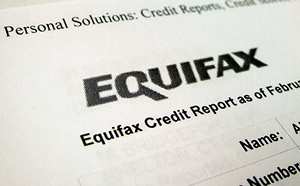"Help, Equifax Won't Give Me My Credit Report!"
A reader just had his credit limit lowered on a credit card due to some bad credit history that he says isn’t his. He’d like to see what’s going on with his credit report, but Equifax says he’ll have to pay for the privilege, because they have no record of any inquiries in the past 60 days. The reader asks, “Has this happened to anyone else, where a credit card company waited over 60 days to notify them of credit limit reductions? Also, does this violate the FCRA?”
Here’s his story:
I recently received a letter from GE Money Bank and Gapcard that notified me that my credit limit was lowered. One of the reasons stated was “Too many accounts in collections,” which worried me because as far as I know, I have NO accounts in collections. I called Equifax to obtain a copy of my credit report, which I thought I would get for free due to the Fair Credit Reporting Act rules about adverse decisions.
Equifax (well, the recording) told me that there had been no inquiries about my credit within the last 60 days, so I was not entitled to a free report. If I wanted one, I would have to pay for it. I called Gapcard to ask when they reviewed my credit limit. The customer service representative told me that it was done “quarterly” and that the report they looked at was “probably from January or February.” The letter I received informing me of my new credit limit was dated April 6th, and stated that the decision was based on a “recent review” of my credit history.
Has this happened to anyone else, where a credit card company waited over 60 days to notify them of credit limit reductions? Also, does this violate the FCRA?
The Fair Credit Reporting Act (PDF) defines the 60-day window as starting from the moment you receive the notice, not when the creditor makes the inquiry or the decision:
§ 612. Charges for certain disclosures [15 U.S.C. § 1681j]
(b) Free disclosure after adverse notice to consumer. Each consumer reporting agency that maintains a file on a consumer shall make all disclosures pursuant to section 609 [§ 1681g] without charge to the consumer if, not later than 60 days after receipt by such consumer of a notification pursuant to section 615 [§ 1681m], or of a notification from a debt collection agency affiliated with that consumer reporting agency stating that the consumer’s credit rating may be or has been adversely affected, the consumer makes a request under section 609 [§ 1681g].
§ 615 of the FCRA explains that the credit issuer has to give you the name of the reporting agency it used to make its decision, so I’m assuming GE Money told you to call Equifax. If not, check the letter to see if it used a different reporting agency.
If Equifax is the right place, then I suspect there’s been a mistake on GE Money’s end and it pulled the wrong credit report, since Equifax’s automatic system is telling you that yours hasn’t been touched since at least early January, and since the information in the credit report is clearly wrong.
In other words, you’ve got a mystery to solve. I suggest you contact GE Money’s reps and tell them you think they’ve made a mistake. If they refuse to cooperate, try talking to someone in the fraud prevention department. This is likely not a fraud issue, but you need to find someone who can take immediate investigative action and not stonewall you.
At the same time, you can try to reach a human at Equifax to get the FCRA-mandated free access to your report. It doesn’t matter what Equifax’s inquiry history shows; you received a notice from the card issuer and by law Equifax has to release the records to you. If you can get past the automated system you might be able to find someone who can help.
If all else fails, try pulling your free credit report(s) via annualcreditreport.com just to make sure that your credit history hasn’t been sullied by bad data or an identity thief.
Want more consumer news? Visit our parent organization, Consumer Reports, for the latest on scams, recalls, and other consumer issues.


